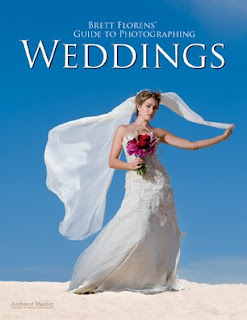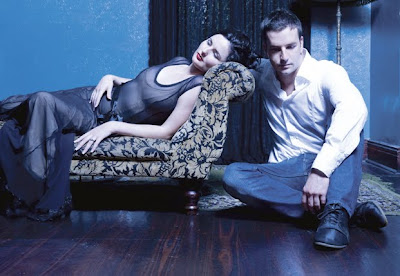
Today's post is an excerpt from the book Brett Florens' Guide to Photographing Weddings. It is available from Amazon.com and other fine retailers.
Once you have sent your quote to a potential client, more often than not they will want to meet with you to have a hands-on look at a portfolio, perhaps a completed album, and also to suss out whether they feel comfortable with you as a person or not. This is where you need to close the deal. They already know what you propose to charge and have probably seen your online portfolio. It’s your approach, ideas, and personality that are going to get them to sign on the dotted line and pay the deposit.

Available light, ISO 400 f/5.6 at 1/125 second, M mode, Nikkor 70–200mm f/2.8 lens. Carefree and dreamy, the engagement session captures the day-to-day romance that is felt between couples about to be wed.
Remember that you will be spending a lot of time with this couple on their day; being friendly, engaging, and taking time to listen to their needs and questions should make them feel comfortable being around you. A photographer who seems arrogant and unfriendly will not be a popular choice—no matter how brilliant his images may be. Dedicate at least an hour to this meeting, and don’t take calls or chat to other clients during this time. It is important to make them feel that they are the only clients you’ve ever had. They must feel that their wedding is as important to you as it is to them. Be careful not to oversell yourself; they are there because they already like your work, so it is unnecessary to go on about how fantastic your work is! Of course, on the other end of the scale, you need to appear to be confident and enthusiastic about your images. Showing them a recently completed album should solidify their confidence in your ability to produce a hot-shot album from start to finish; they’ll know that they are not being fooled by a portfolio of thirty outstanding shots from, perhaps, a choice of a hundred different weddings.
Interact with your clients and show a real interest in their choice of wedding venue and the other suppliers that they have chosen. Let them know if you have worked at their proposed venue before and, if possible, show them images of previous weddings at that venue. This is also an opportunity to show them other peripheral products such as framed images, canvases, and various album choices; these might become add-ons to the package that they choose.
Once the couple have decided to employ you to photograph their wedding, you may want to plan an additional meeting closer to the date to discuss timing and finer details. Discuss, and even advise, the time of the service relative to sunset, as well as the timing of hair and makeup prior to your arrival, letting the client know how far you expect them to be ready when you get to them. I like to have at least an hour and a half with the bride before the ceremony, and I require that she is 80 percent ready when I get to the venue where she is getting dressed. This means that she needs to make sure in advance that the hairdresser and makeup artist will not leave her for last. It is pointless for the photographer to arrive before the ceremony when all he can photograph is a stressed bride in curlers! Inquire as to whether the groom requires preparation shots, too. More often than not, the groom and his best men have something relaxing planned for the morning of the wedding, be it surfing, golfing, or quad-biking. If the package allows the time, these are great shots to add depth to the album.
Make sure that you get all the contact details from the bride and groom, as well as their parents’ details if possible. It is also useful to have the details of all the other vendors that you will be working with. After a few years in the business, you will have the inside scoop on which vendors are always running late, which are pedantic about time, and what their work is like.
Also important to discuss with the bridal couple are their expectations with regard to the images that they want shot. Going through your portfolio together, they will give you a feel as to what images they would ideally like. This is also a good time to choose the venue for the bridal shoot, obviously within a reasonable proximity to the reception venue.
Explain to them, at this stage, that good images do take a certain amount of time and that time management on the wedding day is important. Chatting too long after the service with guests, while the light is fading fast, will necessitate a nudge from you. It’s good to let them know that you will help them to stick to a schedule to optimize the opportunity for outstanding images. The bridal shoot is usually in the region of one hour, and allowances for this must be made prior to the wedding so that the couple ensures that guests are entertained with cocktails or snacks during the time that they are away from them.

Elinchrom 600RX Monolight, ISO 100, f/11 at 1/125 second, M mode, Nikkor 24–70mm f/2.8 lens. From the same engagement shoot as the image on the previous page, this shot shows a completely different side of the couple, expressing their interest in fashion and editorial-style images.
You will need to inform them of the postproduction process, which will involve image enhancement, color management, conversion of raw images, the resizing of images for printing, and the construction of the album. Give them a timeline for when they can expect the finished product. If they are going to be involved in the choosing of the images for the album, then appointments must be made. Bear in mind that client involvement may increase production time and should be incorporated into your costs.
Closer to the day of the wedding, you may be expected to deal with phone calls from an anxious bride needing answers to a dozen questions. Obviously, this is also a time to put the bride at ease and confirm her feeling of confidence in you. You also may be asked to attend the rehearsal at the church. If you feel that you want to charge for your time at this rehearsal, then you must make it known before attending. At an early stage in your career, it may be beneficial to attend; the rehearsals are often set for the same time of day as the ceremony, so you will have a good opportunity to see what the lighting conditions are like and to scout out the ceremony venue for photo opportunities.
Buy this book from Amazon.


